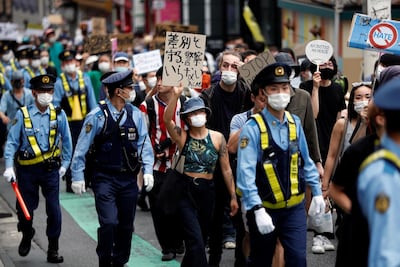Marchers against police brutality towards immigrants merged with supporters of the Black Lives Matter movement on Saturday as hundreds of people gathered in the Shibuya area of Tokyo.
Protesters calling for action after the injury of a 33-year-old Kurdish man by two police officers on May 22 cordially marched alongside demonstrators against racial injustice in a largely peaceful protest.
The crowd chanted “I can’t breathe,” and other slogans criticising the police, as speakers gave speeches in Japanese and English.
The demonstrations in Tokyo joined mass protests in the US following the death of George Floyd, an unarmed black man, at the hands of a White police officer in Minnesota last week.
"It was a very intense experience," a participant, told The National. "I'm disappointed in Prime Minister Abe. He has remained silent on the issue while Trudeau and other leaders commented on Black Lives Matter as a global issue."
Demonstrators told of a handful of disruptions, but the protest was largely peaceful. Intersecting topics, including misogyny and the march’s occurrence during Pride Month were also discussed.
“In my section, there were two men who were very disruptive. One was a white man in a [Make America Great Again] hat who was filming himself and standing in front of people as they were marching," the participant said.
"There was a man...who held up a sign saying that the coronavirus was just a cold. They were escorted out of our sight and we were told to ignore racist comments.”
Saturday's protest against police brutality in Japan was a follow-on from a smaller demonstration of 200 people at the Moai Statue in Tokyo last week. They marched in support of of RG, a Kurdish immigrant who was searched by police while out with friends near JR Ebisu Station on May 22.
RG, who emigrated to Japan 15 years ago from Turkey, and whose full name has been withheld, said he was pulled over by a police car at 3.30pm while driving to a dental appointment.
Officers dragged RG from the vehicle, forcing him to the ground and grabbing him by the neck, he said.
"I couldn't breathe because they kept choking me, and the officers were not wearing masks during this coronavirus pandemic so I was scared," RG said, adding that the officers did not give a reason for the stop, only saying he looked suspicious. They later asked friends if he had drugs in the vehicle.
Noticing the victim’s friend filming the incident on his smartphone, one of the officers pulled back from RG.
Footage from the incident posted on Facebook and Twitter was shared by thousands of people worldwide. The police service declined to comment on the matter.
Kento Suzuki, a 28-year old Uber Eats delivery driver who arranged the demonstrations said a Kurdish friend of his called Deniz, whose surname has been withheld for safety reasons, experienced police brutality at an immigration detention centre in Ibaraki in December 2019.
Despite marrying a Japanese national in 2011, Deniz was not approved for a spousal visa, and was sent to an immigration detention centre. He is currently taking legal action against the government for his treatment and working on obtaining a visa.

"I feel that apathy and distrust towards the police in Japan is growing everyday. Japanese locals are starting to notice how immigrants are treated differently," Mr Suzuki told The National.
Usually, he hosts demonstrations in front of the Tokyo Immigration Detention Centre but this time he told people to gather outside the police station to protest the actions of police officers. He is planning a larger Black Lives Matter march in the near future, he said.
In Japan, police can detain suspects for 23 days without trial. RG was questioned on the street for 20 minutes with more officers arriving at the scene – around 30 in total – to go through his car, tearing open a cardboard box in the boot and rifling through his belongings.
RG and his friends did not resist and were eventually allowed to leave, but not before the police forced them to delete footage of the incident. Later they were able to retrieve a copy of the file saved in iCloud.
“I love living in Japan and when this happened to me, many Japanese people contacted me and showed their compassion towards me. But discrimination still happens sometimes, and it’s the police's job to protect us. They didn’t protect anyone this time. This treatment should end,” RG said.
Tokyo has a sizeable Kurdish community, many of whom emigrated from Gaziantep in Turkey. Across Japan, there are around 2,500 Kurdish residents, who have been arriving since the early 1990s after fleeing persecution in Iraq followed the Gulf War, according to the Japan-Kurdish Cultural Association
Many of those brought up here have settled into Japanese life and become part of the wider community, but older generations have sometimes struggled to integrate with Japanese society. “In my experience, the new generation of Kurdish people in Japan are adapting to Japanese culture and society, but they will never forget who they are,” says Vakkas Colak, a Kurdish language professor at the Tokyo University of Foreign Studies and Secretary General of the Japan-Kurdish Cultural Association.
Very few refugees are granted residency in Japan and many members of the Kurdish community have difficulties with immigration documents, he says. The Japanese government has launched programmes to support immigrant populations adapting to the Japanese way of life but Mr Colak says he would like to see more involvement from Japanese nationals in issues affecting the country’s Kurdish community.
“We expect the Japanese, and everyone in general, to also be supportive in our battle against the oppression from the Turkish government, Iraqi government, Syrian regime, and to value Kurdistan as a nation.”








